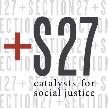TAC and SECTION27 welcome historic judgment in silicosis and TB class action
JOHANNESBURG, FRIDAY 13TH MAY 2016: The Treatment Action Campaign (TAC) and SECTION27 welcome the judgment handed down by Deputy Judge President Mojapelo today in the South Gauteng High Court in the case of Bongani Nkala and 68 Others v Harmony Gold Mining Company Ltd and 31 Others. This judgment is an important step toward providing just compensation for the many thousands of miners who contracted silicosis or tuberculosis on South Africa’s gold mines.
“For over 100 years the mining companies have simply allowed their employees to get sick with silicosis and tuberculosis,” says Anele Yawa, General Secretary of the TAC. “They knew how to protect their workers, but they chose not to do so. This judgment says to those companies that apartheid is over. Under the Constitution you will no longer get away with treating your workers as if they are not human beings.”
The court today certified two classes. The first and larger is gold miners and former gold miners who have contracted silicosis and the second is those who have contracted TB. The class criteria require that a person worked underground in the mines for at least two years since 1965 and contracted either disease. Anyone who meets these criteria is part of the class. The lawsuit, unless settled, will now proceed into trials in which common issues relevant to all class members will be determined.
The court confirmed today that for mineworkers, “it is class action or no action at all. Class action is the only realistic option open to mineworkers and their dependents. It is the only way they would be able to realise their constitutional right of access to court bearing in mind that they are poor, lack the sophistication to litigate individually, have no access to legal representatives and are continually battling the effects of two extremely debilitating diseases.” [para 100]
Today’s judgment is also important for all vulnerable people in South Africa. A class action is a powerful mechanism by which poor or vulnerable people can access justice. It is however not commonly used in South Africa. This judgment helps those who do not have resources on their own to pool efforts in order to access justice. It recalibrates the balance of power to give the poor a better chance of holding the powerful to account. Thus, while the judgment is important in its own right, it also has far reaching implications for the prospects of the poor who seek to challenge the powerful. As the court wrote today “class action represents a paradigmatic shift in the South African legal process” to benefit those for whom it would be otherwise “almost impossible” to win justice. [para 33]
The court’s ruling is also important for women and children who survive mineworkers. Until today, the law in South Africa was that “general damages”, such as damages for pain and suffering, “die with the person.” In other words, they do not go to the surviving family if the victim died before a certain stage in the proceedings known as “litis contestatio” or the close of pleadings. The court today said this law violates the Constitution and needs to be developed to give expression to the Bill of Rights. The court noted that TAC and Sonke “forcefully contend [the rule] had a strong gender bias” against women. [para 214] It reasoned also it is unfair for mining companies to benefit from premature deaths they themselves caused. It developed the law so that general damages may now go to the surviving family, who are primarily women and children who are poor, vulnerable and living in rural areas. This will come as welcome news to the thousands of women and children who sacrificed to take care of sick and dying men.
The court made very strong statements about the requirement for the law to respond to the needs of the poor and vulnerable. It said the common law must keep “abreast of current social conditions and expectations.”
The court also chastised mining companies for their conduct in this litigation, saying “conduct that undermines the cause of justice damages the integrity of the judicial system.” [para 227]
TAC and SECTION27 salute the applicants in the case and their lawyers from the Legal Resources Centre, Richard Spoor Inc. and Abraham Kiewietz Attorneys for their determination and commitment to justice.
TAC and SECTION27 are honoured to have played a part in this landmark court case. TAC and Sonke Gender Justice were admitted as friend of the court and allowed to present additional evidence relating to the importance of a class action as a means to realise constitutional rights, the impact of silicosis and TB on communities and women in particular, and on the transmissibility of compensation to family members.
The judgment can be downloaded here:
Statement issued by TAC and Section27, 13 March 2016

